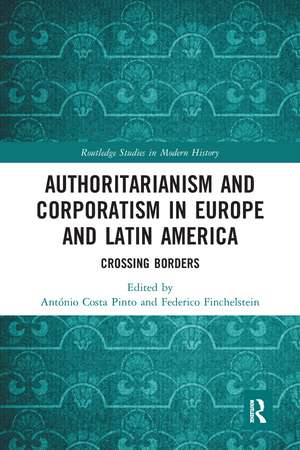Authoritarianism and Corporatism in Europe and Latin America: Crossing Borders: Routledge Studies in Modern History
Editat de António Costa Pinto, Federico Finchelsteinen Limba Engleză Paperback – 30 iun 2020
| Toate formatele și edițiile | Preț | Express |
|---|---|---|
| Paperback (1) | 330.87 lei 6-8 săpt. | |
| Taylor & Francis – 30 iun 2020 | 330.87 lei 6-8 săpt. | |
| Hardback (1) | 655.92 lei 6-8 săpt. | |
| Taylor & Francis – 7 noi 2018 | 655.92 lei 6-8 săpt. |
Din seria Routledge Studies in Modern History
-
 Preț: 300.70 lei
Preț: 300.70 lei -
 Preț: 326.16 lei
Preț: 326.16 lei -
 Preț: 311.48 lei
Preț: 311.48 lei -
 Preț: 312.12 lei
Preț: 312.12 lei -
 Preț: 303.01 lei
Preț: 303.01 lei -
 Preț: 292.90 lei
Preț: 292.90 lei -
 Preț: 312.61 lei
Preț: 312.61 lei -
 Preț: 152.86 lei
Preț: 152.86 lei -
 Preț: 310.95 lei
Preț: 310.95 lei - 9%
 Preț: 935.05 lei
Preț: 935.05 lei -
 Preț: 327.03 lei
Preț: 327.03 lei - 9%
 Preț: 1006.10 lei
Preț: 1006.10 lei -
 Preț: 315.15 lei
Preț: 315.15 lei -
 Preț: 333.88 lei
Preț: 333.88 lei -
 Preț: 310.22 lei
Preț: 310.22 lei -
 Preț: 309.20 lei
Preț: 309.20 lei -
 Preț: 311.41 lei
Preț: 311.41 lei -
 Preț: 326.67 lei
Preț: 326.67 lei -
 Preț: 311.18 lei
Preț: 311.18 lei -
 Preț: 302.88 lei
Preț: 302.88 lei -
 Preț: 311.70 lei
Preț: 311.70 lei -
 Preț: 295.34 lei
Preț: 295.34 lei -
 Preț: 413.13 lei
Preț: 413.13 lei -
 Preț: 437.13 lei
Preț: 437.13 lei - 31%
 Preț: 764.20 lei
Preț: 764.20 lei - 31%
 Preț: 764.62 lei
Preț: 764.62 lei -
 Preț: 495.09 lei
Preț: 495.09 lei - 31%
 Preț: 762.97 lei
Preț: 762.97 lei -
 Preț: 416.22 lei
Preț: 416.22 lei - 18%
 Preț: 729.55 lei
Preț: 729.55 lei - 30%
 Preț: 823.41 lei
Preț: 823.41 lei -
 Preț: 420.77 lei
Preț: 420.77 lei -
 Preț: 490.40 lei
Preț: 490.40 lei -
 Preț: 416.22 lei
Preț: 416.22 lei - 31%
 Preț: 767.38 lei
Preț: 767.38 lei - 18%
 Preț: 1004.55 lei
Preț: 1004.55 lei - 31%
 Preț: 764.20 lei
Preț: 764.20 lei - 30%
 Preț: 876.36 lei
Preț: 876.36 lei - 18%
 Preț: 1113.91 lei
Preț: 1113.91 lei - 18%
 Preț: 1001.07 lei
Preț: 1001.07 lei - 18%
 Preț: 1000.27 lei
Preț: 1000.27 lei - 30%
 Preț: 820.73 lei
Preț: 820.73 lei - 18%
 Preț: 1000.27 lei
Preț: 1000.27 lei - 18%
 Preț: 1004.55 lei
Preț: 1004.55 lei
Preț: 330.87 lei
Nou
Puncte Express: 496
Preț estimativ în valută:
63.33€ • 68.82$ • 53.23£
63.33€ • 68.82$ • 53.23£
Carte tipărită la comandă
Livrare economică 21 aprilie-05 mai
Preluare comenzi: 021 569.72.76
Specificații
ISBN-13: 9780367584320
ISBN-10: 0367584328
Pagini: 312
Dimensiuni: 156 x 234 x 20 mm
Greutate: 0.48 kg
Ediția:1
Editura: Taylor & Francis
Colecția Routledge
Seria Routledge Studies in Modern History
Locul publicării:Oxford, United Kingdom
ISBN-10: 0367584328
Pagini: 312
Dimensiuni: 156 x 234 x 20 mm
Greutate: 0.48 kg
Ediția:1
Editura: Taylor & Francis
Colecția Routledge
Seria Routledge Studies in Modern History
Locul publicării:Oxford, United Kingdom
Public țintă
PostgraduateCuprins
Contents;
List of illustrations;
Notes on contributors;
Preface and acknowledgements ;
1- The worlds of Authoritarian Corporatism in Europe and Latin America Antonio Costa Pinto and Federico Finchelstein;
2--Corporatism and Italian Fascism Goffredo Adinolfi;
3- Intellectuals in the Mirror of Fascist Corporatism at the Turning Point of Mid-Thirties Laura Cerasi;
4- Self-fashioning of a conservative revolutionary: Salazar’s corporatism and the international networks of the 1930’s José Reis Santos ;
5-Mihail Manoilescu and the Debate and Practice of Corporatism in Romania Constantin Iordachi;
6- Corporations against Corporatism in Quisling Norway, 1940 – 1950s Stein U. Larsen;
7- Authoritarianism and Corporatism in Latin America: The first Wave António Costa Pinto ;
8- From Rome to Latin America: the transatlantic influence of fascist corporatism Matteo Pasetti;
9- A Travelling Intellectual of a Travelling Theory: Ramiro de Maeztu as a Transnational Agent of Corporatism Valerio Torreggiani;
10- Fascism and corporatism in the thought of Oliveira Vianna: A creative appropriation Fabio Gentile;
11-Law and Legal Networks in the interwar Corporatist Turn: The Case of Brazil and Portugal Melissa Teixeira;
12-The appropriation of Manoilescu’s The Century of Corporatism in Vargas' Brazil Angela de Castro Gomes;
13-Corporatism, Dictatorship and Populism in Argentina Federico Finchelstein;
14- Nationalist Authoritarianism and Corporatism in Chile Mario Sznadjer;
15- The Global Circulation of Corporatism. Concluding Remarks Sven Reichardt;
Bibliography ;
Index
Notă biografică
António Costa Pinto is Research Professor at the Institute of Social Sciences, University of Lisbon. His research interests include fascism and authoritarianism, political elites and democratization. He is the author of The Nature of Fascism Revisited (2012), and he co-edited Rethinking Fascism and Dictatorship in Europe (2014) andCorporatism and Fascism. The Corporatist Wave in Europe (2017).
Federico Finchelstein is Professor of history at the New School for Social Research, New York. He is the author of several books on fascism, populism, the Holocaust and Jewish history in Europe and Latin America, including Transatlantic Fascism (2010), The Ideological Origins of the Dirty War (2014) and From Fascism to Populism in History (2017).
Federico Finchelstein is Professor of history at the New School for Social Research, New York. He is the author of several books on fascism, populism, the Holocaust and Jewish history in Europe and Latin America, including Transatlantic Fascism (2010), The Ideological Origins of the Dirty War (2014) and From Fascism to Populism in History (2017).
Descriere
What drove the horizontal spread of authoritarianism and corporatism between Europe and Latin America in the twentieth century? What processes of transnational diffusion were in motion and from where to where? In what type of ‘critical junctures’ were they adopted and why did corporatism largely transcend the cultural background of its origins?
